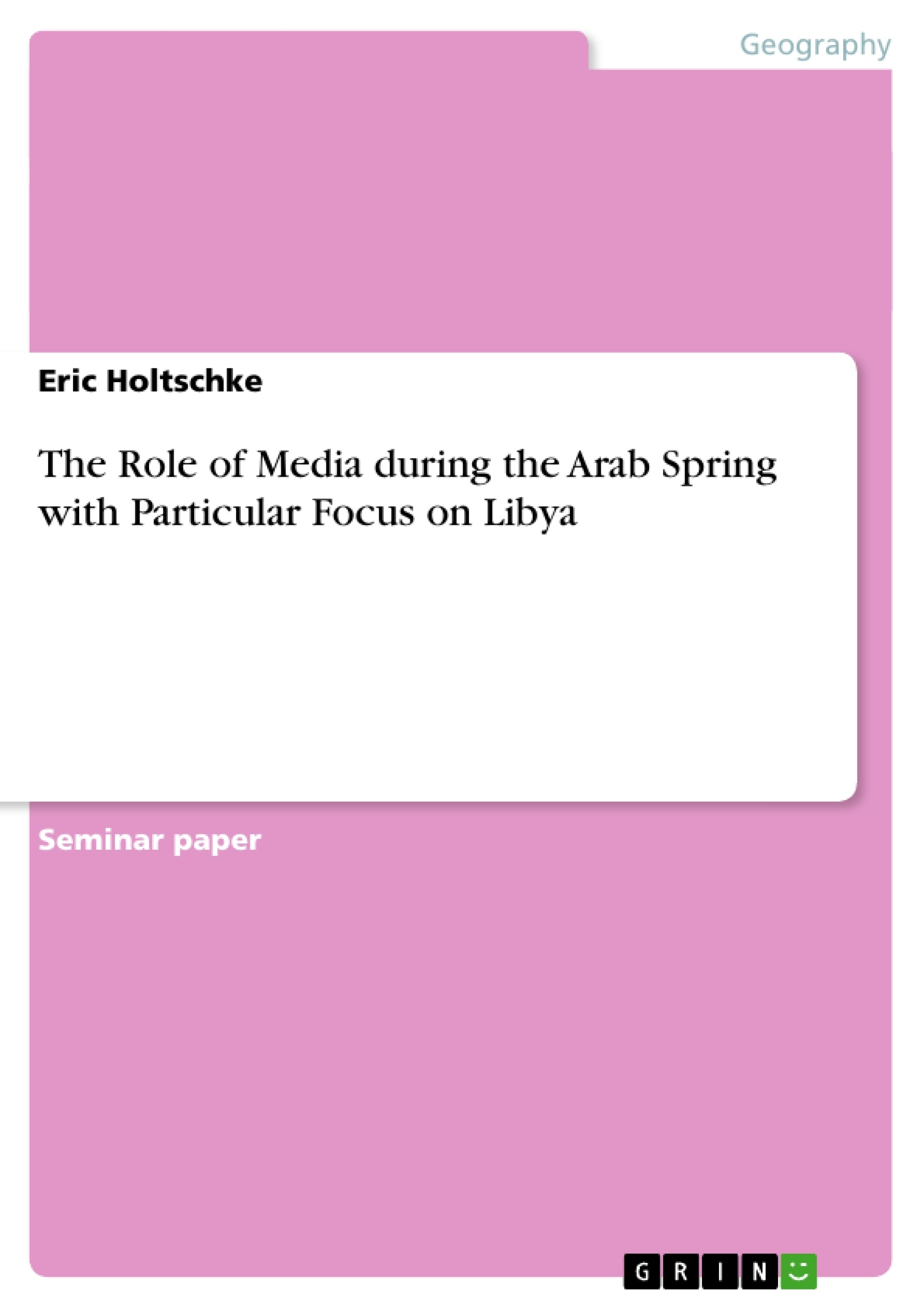When the people in the Arab world started to go out on the streets in December 2010 for the very first time for years, no one of the demonstrators and protesters who were fighting for their rights to live in a better world, in peace, freedom and democracy expected that level of change as a result of their behaviour. Those inconceivable aftermaths did not exist neither in the minds of the people in Tunisia, the nucleus of the Arab Spring, nor in the minds of the people who were joining that wave of protest country by country afterwards. Before that uprising arrived Libya, which is in the focus of attention here, in February 2011, the revolt expanded over the Middle East and North Africa. Never before mass media, including radio, television and, especially the internet (with Facebook, Twitter and YouTube), was taken such a significant role during uprisings since the end of the year 2010. No one of the participants, who were involved in this uprising, no one of the politicians, no one of the citizens in the Western world, no one of the former leader of those regimes and no one of the media companies could count on this great measure of transformation in the Arab world. States were dissolved, former inhuman leaders of a regime were captured or killed and new fundaments of a modern, democratic and liberalized nation were created by the people or the opposition of those long lasting dictatorial and authoritarian leaders.
Inhaltsverzeichnis (Table of Contents)
- Introduction
- Problem Statement
- Structure
- State of Research
- Definitions
- Arab Spring
- Media
- The Awakening of the Arab World: The Arab Spring in Libya
- Backgrounds
- Course
- Results
- The Interdependency of Media and Arab Spring
- Arab Spring without Media?
- What Media can do and can not do
- A possible Scenario
- Abstract
Zielsetzung und Themenschwerpunkte (Objectives and Key Themes)
This paper investigates the complex relationship between mass media and the Arab Spring, particularly focusing on the case of Libya. It aims to analyze how media, especially social media platforms like Facebook and Twitter, influenced the course and outcomes of the uprisings. The paper explores the role of media in facilitating communication, disseminating information, and mobilizing citizens during the protests.
- The role of mass media in the Arab Spring, particularly in Libya
- The impact of social media platforms on the spread and mobilization of protests
- The limitations and potential consequences of media influence during revolutions
- The interplay between traditional and social media in shaping public opinion and political discourse
- The potential scenarios of the Arab Spring in the absence of media or internet access
Zusammenfassung der Kapitel (Chapter Summaries)
The first chapter introduces the topic, outlining the problem statement, research structure, and existing literature. The second chapter provides definitions of key terms, including the Arab Spring and the role of media in shaping political events. The third chapter examines the Arab Spring in Libya, focusing on its historical context, course, and outcomes. The fourth chapter delves into the interdependency between media and the Arab Spring, analyzing the potential of media to influence the course of events and exploring a possible scenario without its presence. This chapter discusses the limitations and capabilities of media during revolutionary periods.
Schlüsselwörter (Keywords)
Arab Spring, Libya, mass media, social media, Facebook, Twitter, revolution, protest, communication, information dissemination, political mobilization, public opinion, political discourse, scenario, limitations, capabilities.
Frequently Asked Questions
What role did media play in the Arab Spring in Libya?
Mass media, including radio, television, and especially social media platforms like Facebook and Twitter, were significant in mobilizing protesters and disseminating information during the 2011 uprising.
How did the Arab Spring begin?
The Arab Spring originated in Tunisia in December 2010 and subsequently expanded across the Middle East and North Africa, reaching Libya in February 2011.
What were the results of the uprising in Libya?
The uprising led to the dissolution of the existing regime, the capture or death of the long-standing dictatorial leader, and the creation of new foundations for a more democratic nation.
Could the Arab Spring have happened without the internet?
The paper explores this interdependency, analyzing whether the movement could have achieved the same scale of transformation without the speed and reach provided by modern digital media.
What are the limitations of media during such revolutions?
While media facilitates communication and mobilization, the paper discusses its limitations in terms of creating lasting political stability and its susceptibility to state control or misinformation.
- Citar trabajo
- B.A. Eric Holtschke (Autor), 2013, The Role of Media during the Arab Spring with Particular Focus on Libya, Múnich, GRIN Verlag, https://www.grin.com/document/209829



